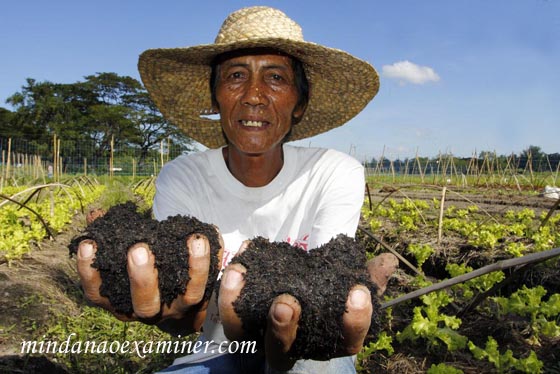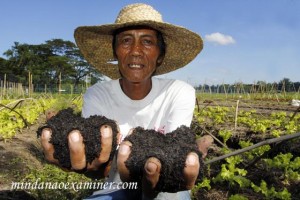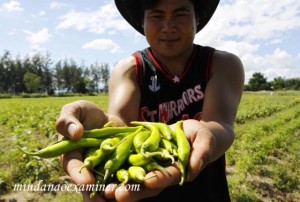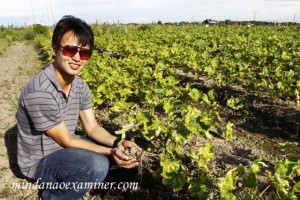
COTABATO CITY (Mindanao Examiner / Feb. 21, 2012) – When plants are grown and harvested, they are removed from the fields and the soil losses certain quantities of nutrients that nourish them.
This entails the need to replenish the lost nutrients of the soil or consequences, like; production yield will be the first to undergo changes.
Most farmers rely on conventional system to resolve such cultivation predicament. Farmers usually resort to the use of chemical based fertilizers to supplement this crop growing deficiency.
Likewise, with the availability of environmentally responsive technologies, many in the Philippine farming system still rely on conventional farming method which uses agro-chemical products, such as fertilizers, pesticides, fungicides, feeds, antibiotics and others when in fact organic farming system that uses organically produced fertilizers brings the soil and the environment back to its original form and by which nature works for the production of its needs are unclaimed by the countless.
Organic farming system adopters when asked why they shifted from chemical based inputs to natural or organic farming, they agreed with the same declaration “it’s faming with nature, not against it”.
Another reason is that chemical-based fertilizers, pesticides and even herbicides which are the usual farmers’ inputs have become too expensive for ordinary farmers. This also results to increase in food prices beyond the reach of more and more families.
The message is clear the time has come to see and feel realities that most of our farmers or producers for that matter can no longer afford the luxury of increasing prices of chemicals and imported feeds for animals.
The search for an alternative to support agriculture has ended in nature which farming began thousands of years ago but from which the chemical technology separated the embattled farmers of today.
It’s just a matter of time before we return to compost farming which means farming with less chemical poisons.
And what is Organic farming system? It is a method of farming system which primarily aimed at cultivating the land and raising crops in such a way as to keep the soil alive and in good health by use of organic wastes (crop, animal and farm wastes, aquatic wastes) and other biological materials along with beneficial microbes (bio-fertilizers) to release nutrients to crops for increased sustainable production in an eco friendly and pollution free environment.
The United States Department of Agriculture study team said “organic farming is a system which avoids or largely excludes the use of synthetic inputs (such as fertilizers, pesticides, hormones, feed additives etc) and to the maximum extent feasibly relying upon crop rotations, crop residues, animal manures, off-farm organic waste, mineral grade rock additives and biological system of nutrient mobilization and plant protection.”
Food and Agriculture Organization of the United Nation also suggested that “organic agriculture is a unique production management system which promotes and enhances agro-ecosystem health, including biodiversity, biological cycles and soil biological activity, and this is accomplished by using on-farm agronomic, biological and mechanical methods in exclusion of all synthetic off-farm inputs.”
For the followers of natural farming, it is not just a technique; it’s a new philosophy, a new economics and a way of life. The governor of Tarlac, Victor Yap, is focused and full of dynamism for an adequate adaptation of natural organic farming, hence the province hosted the recently concluded 8th National Organic Agriculture Conference at the Aquino Center in Tarlac.
The conference was conducted to serve among others as platform for the key players to discuss the emerging issues regarding organic farming. The province of Tarlac which adapted the organic and natural farming not too long ago, has already made a substantial produce to speak of.
Farmers practicing natural farming build a sustainable future for every aspect of the planet, soil, water supply and the health of the animals and humans. It reduces health risk that been link to the use of synthetic pesticides.
They also benefit from the technology; it’s environmentally friendly due to its non-chemical and pollutant nature of farming. It increases yield and reduces costs of production.
On the whole, the technology fosters better quality of yield, farmer-friendly and adhering the principle to respect life. Profitability, productivity and sustainability are factors that determine suitability of a resolute farming system.
Some said conventional farming can be profitable but experienced farmers say, only for the first two years then the soil nutrients become degraded and surely their profits go down. In livestock profit is slim due to high input. Profit can be high but can be devoured up by the high amount of inputs.
In natural farming, profits can be high and will increase annually and for livestock profit is high due to low cost of labor requirement and maintenance and consumption. Production yield will be high too and will be beneficial for a longer period of time.
Erning Santos, 67, and a farmer from Tarlac City, recently bared an innate experience on how to deal with his farm as well as an inclusive effect on his well-being. This was his discovery of a farming technology that makes use of natural elements in cultivating crops.
Santos used to tend a trivial part of his farm using chemical based fertilizers that are not only expensive but sets toll on his health.
Presently, Santos shifted to what he said was a natural way for farming – he prepares his so called organic fertilizers by making used of certain raw materials which are commonly found at his farm.
Santos used his vermin-cast, a mixture of organic materials and earthworm waste to supplement and improve his farm soil and has given him at least four harvesting galore for the last three months.
He also made mention of their local government unit helping them through provision of seeds, assistance on land preparation and marketing of their produce; a basic requirement for local and small farmers to sustain agricultural productivity in their locality. It is a very essential element for farmers to succeed; it is the collaboration and support from concern government authorities.
These raw materials are composed of rice straws, cornstalks, grass, weeds and manures of various animals then mixed together with plenty of water into a compost pit which is the core of organic farming and within two months, the compost is ready for use in the field because the decayed product is rich in humus, a very significant nature’s reserves.
Reynaldo Vitug, 38, another organic farming enthusiast and a village chieftain of Lapaz Bamban in Tarlac City, said he used lahar, a residual dust from the explosion of Mount Pinatubo as a farming medium mixed with carbonized rice hull, rice straw and vermin-cast. The mixture came out with a sandy to sandy loam type of fertilized soil with no water retention and is easily drained.
Now, Vitug enjoys a two-hectare demonstration farm which he started in September last year and planted it with bell pepper and other root crops that have withstood the destructive force of typhoons Pedring and Kiel.
And a month later, harvesting still continues for Vitug from the date of transplanting his crops. He is now harvesting his bell pepper six times in month a three-day interval between harvest times.
Vitug also used an organic yellow insect traps – greased insect trap with no chemical insecticide as component to take care of insect pests that attack his crops. It is seldom that successful personalities with deep urban exposure pursue farming as a vocation.
Christian Yap, 26, and a graduate of Development Studies and Communication at Ateneo de Manila, suffered a rare allergic reaction in 2009 – he gets skin rashes every time he consumes commercially-prepared chicken meat from fast food chains.
He then understands that most of these agricultural products are grown and fed using some chemical based inputs which he suspected to be a factor of his allergies.
Yap conducted a research to combat his newly found weakness on food and it was providential that an invitation to join a seven-day crash course training on natural farming in Davao City came and he immediately took the opportunity.
This learning experience transformed his interest and attention on a pursuit to produce naturally grown livestock with no chemical poisoning inputs involve in its production. He then started to develop a three- hectare farm land and eventually expanded it to 14-hectare with integrating other farming production venture.
Organic agriculture should take into consideration a management with precautionary and responsible manner thereby protecting the health and well-being of current and future generations and of course, the environment. It is a living and dynamic system that responds to internal and external demands and conditions.
Practitioners of organic agriculture can enhance efficiency and increase productivity, but this should not be at the risk of jeopardizing health and well-being. Consequently, new technologies need to be assessed and existing methods reviewed. Given the incomplete understanding of ecosystems and agriculture, care must be taken.
This principle states that precaution and responsibility are the key concerns in management, development and technology choices in organic agriculture. Science is necessary to ensure that organic agriculture is healthy, safe and ecologically sound. However, scientific knowledge alone is not sufficient.
Practical experience, accumulated wisdom and traditional and indigenous knowledge offer valid solutions, tested by time. Organic agriculture should prevent significant risks by adopting appropriate technologies and rejecting unpredictable ones, such as genetic engineering.
Decisions should reflect the values and needs of all who might be affected, through transparent and participatory processes. (Mark Navales and Mohidhen Acoymo)



